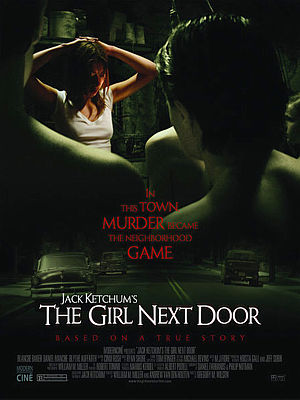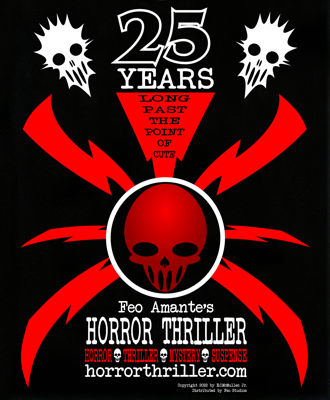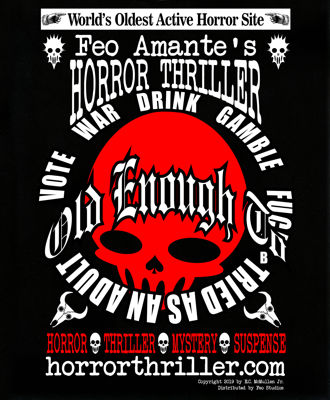 |
 |
Review by Monica J. O'Rourke |
|

USA Release: Oct. 3, 2007 Modernciné / Modern Girl Productions Rated: Australia: MA / Germany: 18 / U.K.: 15 / USA: R |
|||
A rash of recent horror movies have focused on gore, sex and torture purely for shock value. THE DEVIL'S REJECTS, HOSTEL, SAW, WOLF CREEK - the small budget Home Sick (and some critics daresay The Passion of the Christ falls into this category) - capitalize on the newly ordained "gorn" (gore-porn) movement. A more intense throwback to the horror movies of the 60s, 70s and 80s; where sex, drugs and merely being unfortunate enough to have reached puberty signed your death warrant. The craze is back it seems.
Wary celluloid travelers should expect to lose body parts just for the fun of it. This isn't exactly new territory - Bava, Argento and certainly Herschell Gordon Lewis were doing it long before Eli Roth stepped in. As David Edelstein said in his recent article "Now Playing at Your Local Multiplex: Torture Porn," in New York Magazine, "Seen any good surgery on un-anesthetized people lately?"
Jack Ketchum's THE GIRL NEXT DOOR director Gregory Wilson (HOME INVADERS) had every opportunity to jump on the viscera bandwagon, but he took the higher road. Or, perhaps, the road less traveled. Which is not to say THE GIRL NEXT DOOR is a romp in the park.
Loosely based on actual events (see the Sylvia Likens case), Ruth Chandler (Blanche Baker) takes in her orphaned nieces to raise as her own. But this is where any similarity to a happy nuclear family ends. Ruth is a beer swilling, chain smoking, anorectic-looking housemother of the 50s, and her own children are boys. Ruth is also clearly a sociopath, and clearly the product of some rather horrific sexual relationship, given her aversion to and intense disdain of sex and anything remotely sexual.
Sixteen-year-old Meg Loughlin (played with a charming innocence by Blythe Auffarth in her first movie role) is the victim in the story, a girl just discovering herself and her attraction to boys. David, the focal point of the story and the (adult) narrator (played by the remarkably talented Daniel Manche, HEADSPACE), is torn between his friendship with Meg and doing what he believes is the right thing, and being under the influence of the powerful and adult Ruth. Like most children, particularly in the 50s, when adults could expect respect and to some degree compliance when it came to younger kids, David is easily influenced by the older figure, especially one who shares her beer and cigarettes. But David has a conscience, and a normal bent, and he knows on some level - you see by his uncomfortable reactions - that what Ruth is doing is wrong. But he's also afraid of what to expect should he actually go up against her.
Co-scriptwriters Daniel Farrands (HALLOWEEN: The Curse of Michael Myers, THE TOOTH FAIRY) and Philip Nutman (WETWORK) remain faithful to Ketchum's novel, closely sticking with the plot and violence as originally penned.
The development the characters, particularly Meg and David is a slow process, a mixture of teenage angst and puppy love, realistic and touching without being maudlin. Ruth's boys are not memorable characters, nor are they meant to be. They're boys, at first they act the way boys act: sneaky, devilish, perhaps a little sadistic, but nothing abnormal for a group of pre- and post-adolescents. They play silly games in the woods. But this is perhaps where Ruth's sadism is the most influential: the game involves tying a girl to a tree, and the children tread carefully here, testing their limits, starting slowly and building throughout the film. The more leeway Ruth gives them the more they take, until it reaches its crescendo. The boys are no longer dabbling in sadism; they’ve crossed the line into sociopathy.
The character of Meg's sister Susan (Madeline Taylor) was underdeveloped, which is surprising given such a crucial role. Susan, crippled in a car accident, is the catalyst to Ruth's beginning abuse, and the reason Meg is unable to leave. The young actress seems to have difficulty playing the part, is often expressionless, even when her sister is being tortured. Playing numb or shell shocked is one thing, but this girl seems as if she's bored with Saturday morning cartoons. Director Wilson would have been better off throwing Susan into a catatonic state of shock.
The torture in THE GIRL NEXT DOOR is certainly shocking on any level, particularly that it was based on a true story. Despite moviegoers being inured to most forms of violence it seems, it still is hard to comprehend how anyone could cause such harm to another human being. What's even more unpleasant is that this violence is being perpetrated against children. Seeing it played out can take your breath, and you can't imagine that it can get any worse. After all, this girl is only sixteen. Surely it can't continue. Surely someone has to come along and save her.
Baker (playing Ruth) was handed a gift in the form of this script: the opportunity to play a villain, a part that doesn't come along very often in Hollywood (male villains are common; women not so much). Like Jack Torrence in THE SHINING, there is no slow descent into madness. There is only madness.
Watching THE GIRL NEXT DOOR will leave you exhausted, feeling a little dirty and emotionally drained, and you probably won't want to sit through it more than once (I also feel this way about REQUIEM FOR A DREAM - brilliant, but I doubt I'll ever watch it again; too painful). But you should watch, for the marvelous acting, amazing script and direction, and breathtaking cinematography. Despite its subject (or perhaps because of it), it's a remarkable movie. Bravo to producer Andrew van den Houten (of MODERNCINÉ), author Ketchum, scriptwriters Farrands and Nutman, director Gregory Wilson, and everyone involved for giving voice to a young woman who would probably have otherwise disappeared into True Crime obscurity.
4 Shriekgirls




This review copyright 2007 E.C.McMullen Jr.

|
| DRESS NICE | |
FEO AMANTE'S HORROR THRILLERCreated by:E.C.McMullen Jr. FOLLOW ME @ |
| Amazon |
| ECMJr |
| Feo Blog |
| IMDb |
| Stage32 |
| Twitter X |
| YouTube |
| Zazzle Shop |
| ARTICLES AND INTERVIEWS
|

